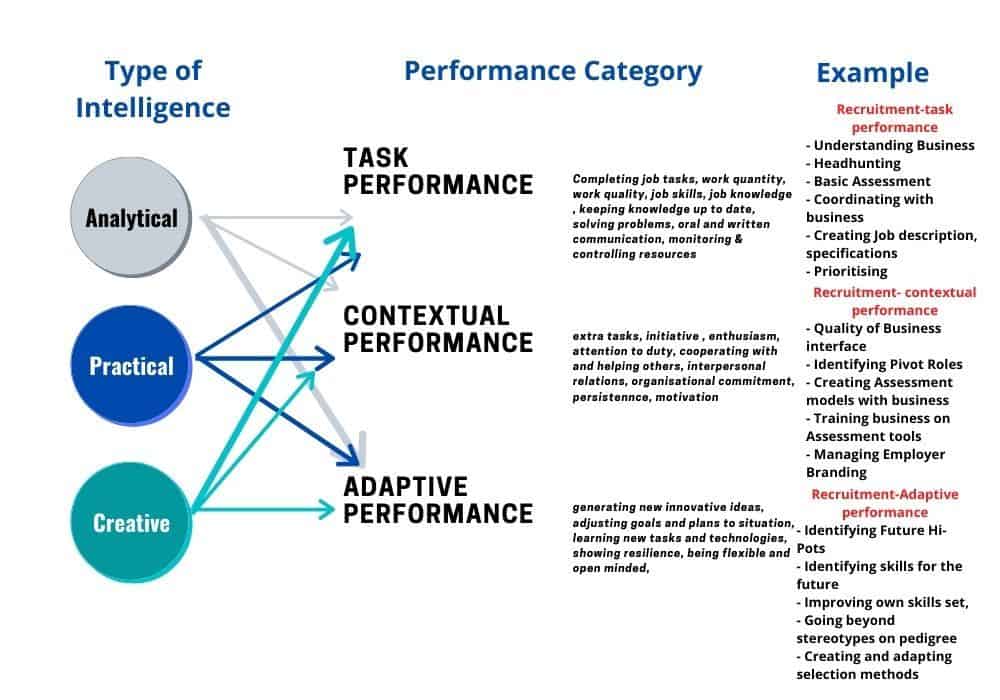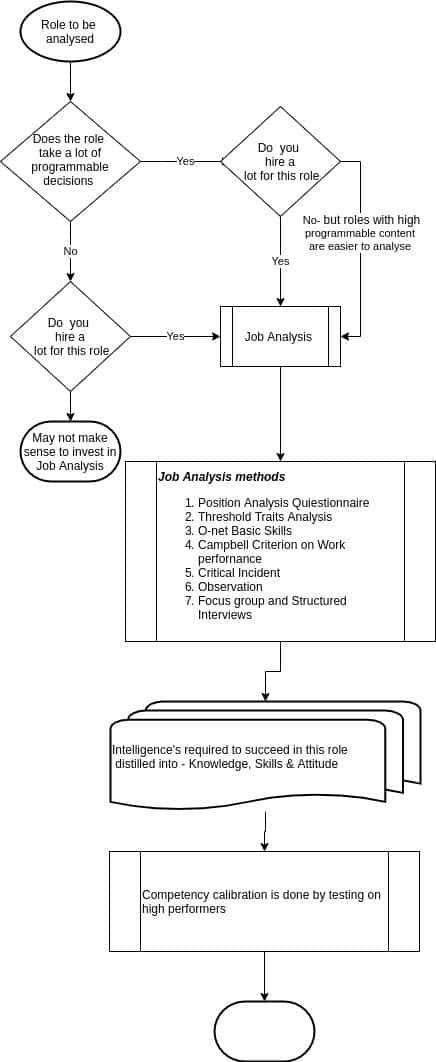The Triarchic model of Intelligence we discussed in Intelligence 101 can be linked to Performance Categories
- Task Performance- Directly linked to Analytical Intelligence or Problem solving- this is the easiest to check as it is a function of knowledge gained thru academics or experience.
- Contextual Performance is linked to Practical Intelligence , as it includes real world skills like interpersonal relations, organisational commitment, application of knowledge and observable skills
- Adaptive Performance- is linked to Creative Intelligence and Fluid adaption to situation as it includes generating novel ideas, and reacting to unknown factors and changes


The Journey from Role Identification to Competencies to be assessed
Roles can be quickly segregated on the basis of Programmable and Non- Programmable decisions made by them .
Here programmable decisions have nothing to do with Software programming- this concept was given by Herbert Simon it basically means Programmed decisions are routine and repetitious (well-structured) and lend themselves to solution by application of established procedures. These decisions are taken based on the existing policy, rule or procedure of the organization. For example: making purchase orders, sanctioning of different types of leave, increments in salary, etc. Software services, maintenance, implementation of ERP Systems or even creation of new campaigns would come under Programmable decisions. Financial Statement Analysis, Internal audit are all under the ambit of Programmable decisions as they follow a laid down process combined with identified skills and competencies
Non-programmed decisions require judgement, intuition, creativity, rules of thumb (heuristics). How do you make decisions on strategy, market penetration, new product creation, creation of new product and services. Set procedures here are nothing but guides as all the variables affecting the decision cannot be factored in , some of them are known unknowns and some of them can be unknown – unknowns ( blinds spots). So as we go up the hierarchy more and more non-programmed decisions are taken and hence getting a comprehensive Knowledge and Skill inventory is tough
Attitude/Potential Assessment is tougher and I usually recommend the 6 traits identified by Ian Macrae & Adrian Furnham of the University of London. They are derived from the Big 5 traits of Personality traits – the most cited model of personality ( so if personality theory was on social media- this would have the maximum likes)
Conscientiousness
Conscientious people commit themselves to plans and make sure they carry them out to the letter. They are good at overcoming their impulses and thinking about the wisdom of their decisions for the long-term. After IQ, conscientiousness is often considered one of the best predictors of life outcomes like educational success. At work, high conscientiousness is essential for good strategic planning, but in excess it may also mean that you are too rigid and inflexible.
Adjustment
Everyone faces anxieties, but people with high adjustment can cope with them more easily under pressure, without allowing it to negatively influence their behaviour and decision-making. People with low scores on this scale do appear to suffer from poor performance at work, but you can mitigate those effects with the right mindset. Various studies have shown that reframing a stressful situation as a potential source of growth – rather than a threat to their wellbeing – can help people to recover from negative situations more quickly and more productively.
Ambiguity acceptance
Are you the kind of person who would prefer tasks to be well-defined and predictable? Or do you relish the unknown? People with a high tolerance for ambiguity can incorporate many more viewpoints before coming to a decision, which means they are less dogmatic and more nuanced in their opinions.The only problem is if you hire for Audit, or risk Management -Ambiguity acceptance can be a curse then
Curiosity
Compared to our other mental traits, curiosity has been somewhat neglected by psychologists. Yet recent research shows that an inherent interest in new ideas brings many advantages to the workplace: it may mean that you are more creative and flexible in the procedures you use, help you to learn more easily, increases your overall job satisfaction and protects you from burnout.
In excess, however, curiosity can also lead you to have a “butterfly mind” – flying from project to project without seeing them through.
Competitiveness
There’s a fine line between striving for personal success and caving into unhealthy jealousy of others. At its best, competitiveness can be a powerful motivation that leads you to go the extra mile; at its worst, it can lead teams to break down.
References
- Conceptual Framework of Individual Performance- Linda Koopmans, MSc, Claire M. Bernaards, PhD, Vincent H. Hildebrandt, PhD, Wilmar B. Schaufeli, PhD,Henrica C.W. de Vet, PhD, and Allard J. van der Beek, PhD
- The modeling and assessment of Work Performance – John P. Campbell and Brenton M. Wiernik
- High Potential: How to Spot, Manage and Develop Talented People at Work- Ian MacRae , Adrian Furnham
Omar Farooq- Founder & CEO of AceProHR
Great teams are not made by chance- Ask us how we can help you win the Talent war

